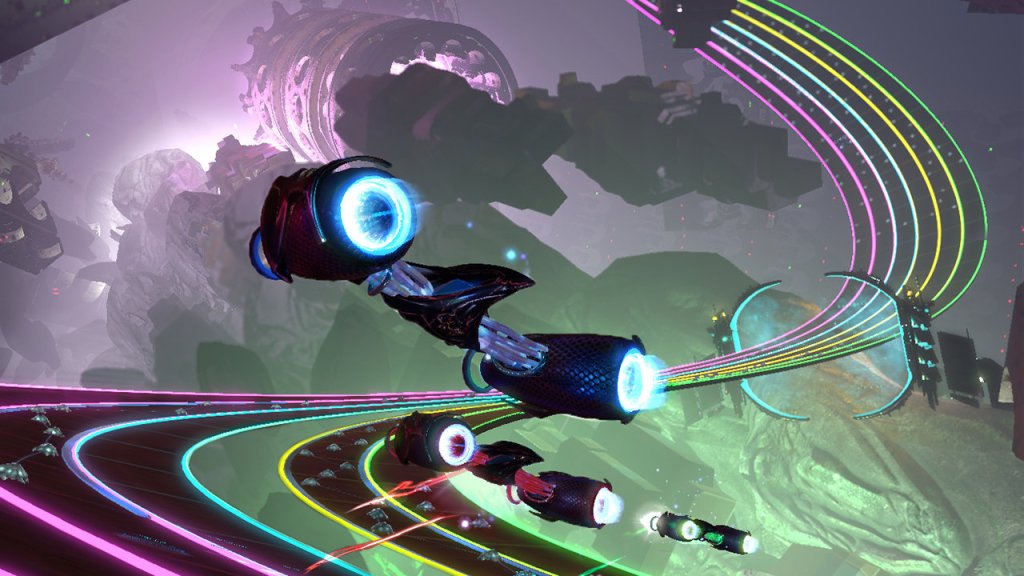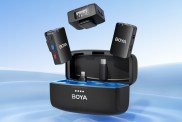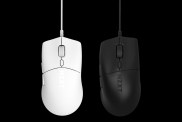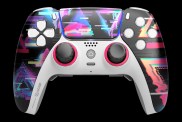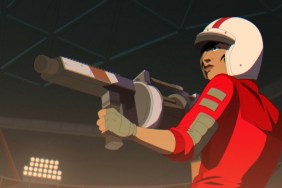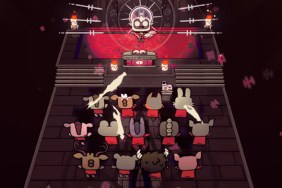I. Want. To. Be. Synthesized.
I owe the original Amplitude for the PlayStation 2 much, along with Rez and Dance Dance Revolution, for cementing my affection for the rhythm genre. Harmonix veterans will know of this lane-oriented game well before the developer became a household name with the Rock Band series and may even remember Frequency, which served as the predecessor for Amplitude as well as the spinoffs Rock Band Unplugged and Rock Band Blitz. This version of Amplitude, which is more of a reboot than the “remake” which it has been called, attempts to recapture that nostalgic feeling of synesthesia and in fact relied on it to raise over $800,000 dollars in its Kickstarter campaign back in May 2014. The result is a competent re-imagining of the original title with various aspects shifted around, for better and worse.
It's clear from the opening tutorial that, in addition to the smooth, vibrant, and neon-tastic graphics, both the framework and the attitude of this revamped Amplitude has been altered from the original. The player DJ avatar, which brought a lot of personality in the past, no longer exists, in favor of a selection of colored ships that wouldn't be out of place in the Wipeout racing series. Instead of ostensibly playing a series of short setlists at various clubs, you are placed in the role of a doctor or, perhaps more directly, an experimental treatment in re-stimulating a patient's brain through the power of music, I suppose. The campaign (once the download for the game finishes) has you move from the prefrontal cortex through to the limbic system, restoring cranial function by completing songs that gradually become more and more challenging.
Amplitude still works as veterans would expect, with the core gameplay revolving around blasting capsules as they come down the lane. The default setup has you using three shoulder buttons to destroy the left, center, and right capsules, though you may find (as I did) that the alternate control scheme using the face buttons better. Just be warned that you may get finger cramps either way. Each lane represents a particular layer of the song—synth, bass, guitar, vocal, etc.—and if you manage to hit every capsule in a phrase, you'll unlock that track and hear it playing for about ten measures before you'll need to unlock it again. This freeform additive and subtractive layering creates an interesting musical texture every time a track is replayed.
If you miss a note, though, you'll lose energy and fail the course if you run out, but there are plenty of checkpoints that will restore all your lost energy to ensure that you make it to the end. You can also acquire boost power-ups that slow down the track, clear a track in an instant, double the point value, or have you perform freestyle without having to worry about hitting any capsules at all.
While hitting all of the notes in a phase is challenging in its own right, particularly on Expert or the unlockable Super difficulty, the main difficulty is actually streaking (whether you've got your underpants on or not, har har). Moving from one track to the next contributes up to a 4x multiplier, so scoring high means traveling from lane to lane smoothly, following the beacons of light that show which capsules on other lanes need to be hit to continue your streak. Luckily, this version of Amplitude will autolock you onto the next free lane instead of hitting left or right on the D-pad 2-5 times just to find the next lane.
But streaking is easier said than done, since a track can be so far to the left or the right that you can't tell what the next capsule is going to be at all. Or sometimes a track doesn't exist as all, leaving gaps that make the layout tricky. Or the last capsule in a phrase is an eighth or sixteenth note and you accidentally move to another track before finishing the track you're on. Or the track curves so much that you can hardly see what capsules are coming up until they're millimeters away from your ship.
That said, climbing the leaderboards and earning three gold bar ratings requires skill, patience, and persistence. As someone who (at the time of this writing) ranks in the Top 100 for overall score on the game, I can tell you that it takes quite a bit of trial of error to find out where the score-doubler boosts are and which routes will score the most points. And just completing some songs like “Synthesized” (which Amplitude fans will recognize) on Super difficulty, which has no checkpoints to restore energy and removes all boosts aside from the score doubler, is almost impossible without spraining a few fingers first.
Overall, the track selection is satisfactory and somewhat myopically concentrates on electronic music much more than the original list. Some songs must be unlocked first by completing songs a certain number of times or by going through the campaign, but the entire track list can be unlocked within a day so it's nothing to worry about. A few surprises are sprinkled throughout like “Crypteque” from the amazing Crypt of the Necrodancer soundtrack and “Unfinished Business” from the Skullgirls soundtrack, but the general lack of genre variety is a slight letdown compared to the range of pop, rock, jazz, rap, and electronica from the classic Amplitude.
There's not much to do, though, after you've finished the rather short campaign and explored the fun distraction of the four-player multiplayer mode. This doesn't mean Amplitude isn't worth playing over again for higher scores, but there isn't that much content to pour over. Hopefully, there are more DLC packs with indie-game music or alternative genres of music ready to release in the future.
Amplitude is a solid remix of the original that should win over longtime fans as well as new players who want to explore a fresh version of a game that brought Harmonix into prominence. The track list could have been fuller in terms of quantity and genre variety, but the gameplay remains challenging, crisp, and energetic. Put on a pair of quality headphones, and Amplitude is worth every note.
Code provided by publisher. Review based on PS4 version. Also available on PS3.
-
Challenging rhythm-based gameplay
-
Unlockable Super difficulty
-
Satisfactory track list with a few indie-game surprises
-
...but still could have had more genre variety
-
Smooth, vibrant graphics
-
Short campaign, not a lot of content
